语法知识—介词的分类汇编含答案
初中英语语法知识—介词的分类汇编含答案解析(1)
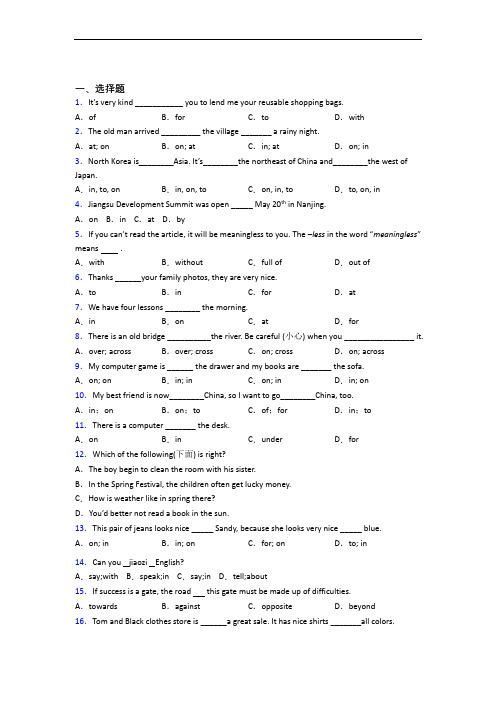
一、选择题1.It’s very kind ___________ you to lend me your reusable shopping bags.A.of B.for C.to D.with2.The old man arrived _________ the village _______ a rainy night.A.at; on B.on; at C.in; at D.on; in3.North Korea is________Asia. It’s________the nor theast of China and________the west of Japan.A.in, to, on B.in, on, to C.on, in, to D.to, on, in 4.Jiangsu Development Summit was open _____ May 20th in Nanjing.A.on B.in C.at D.by5.If you can’t read the article, it will be meaningless to you. The –less in the word “meaningless” means .A.with B.without C.full of D.out of6.Thanks ______your family photos, they are very nice.A.to B.in C.for D.at7.We have four lessons ________ the morning.A.in B.on C.at D.for8.There is an old bridge __________the river. Be careful (小心) when you ________________ it. A.over; across B.over; cross C.on; cross D.on; across9.My computer game is ______ the drawer and my books are _______ the sofa.A.on; on B.in; in C.on; in D.in; on10.My best friend is now________China, so I want to go________China, too.A.in;on B.on;to C.of;for D.in;to11.There is a computer _______ the desk.A.on B.in C.under D.for12.Which of the following(下面) is right?A.The boy begin to clean the room with his sister.B.In the Spring Festival, the children often get lucky money.C.How is weather like in spring there?D.You’d better not read a book in the sun.13.This pair of jeans looks nice _____ Sandy, because she looks very nice _____ blue.A.on; in B.in; on C.for; on D.to; in14.Can you jiaozi English?A.say;with B.speak;in C.say;in D.tell;about15.If success is a gate, the road this gate must be made up of difficulties.A.towards B.against C.opposite D.beyond16.Tom and Black clothes store is ______a great sale. It has nice shirts _______all colors.A.at; in B.on; at C.of; in17.After working her way around the world, Annie ended up English as a foreign language. A.teach B.taughtC.teaching D.to teach18.There________ a hamburger and bananas________there.A.is;in B.are;in C.is;/ D.are;/ 19.—What are these ________ English?—These are egg-cups.A.at B.to C.on D.in20.He has a garden __________ a lot of flowers.A.has B.there is C.with21.(2017年安徽) To my pleasure, my family is always _____ me whatever I decide to do. A.above B.behind C.from D.through22.We started out in early spring and headed west the northern part of Asia. A.through B.between C.among D.across 23.Don’t leave the room _____ the light on .A.in B.on C.about D.with24.I want to l earn English well because I don’t want to talk with foreigners ________ anybody else.A.by B.through C.across D.at25.The accident took place ________ a cold February evening.A.on B.in C.at D.for【参考答案】***试卷处理标记,请不要删除一、选择题1.A解析:A【解析】句意:你把可再用的购物袋借给我,真是太好了。
(完整版)高考介词讲解和习题集(答案解析)介词

介词1. 介词的分类1) 简单介词如:at,between,in,to等2) 合成介词如:into,upon,without等3) 介词短语如because of,in front of等①数词或从句 e.g. Who’s knocking at the door?(名词)②介词短语的用法A.作状语 e.g. I arrived at the concert hall in time(时间状语).B.作定语 e.g. Here is a cheque for $30(定语).C.作表语 e.g. The museum is just across the street(表语).D.作宾语补足语 e.g. We must keep the classroom in good order(补语:表明教室的状态).2. 常用介词用法辨析1) 表示时间的介词①表示年、月、日、时刻等用at,in,onA.at用于表示时刻、时刻的某一点 e.g. at eleven o’clock \ at noon \ at presentB.on用于表示某日,某天的上午、下午、晚上 e.g. on Saturday \ On March 8thC.in用于表示一段时间或季节 e.g. in December \ in spring②before,afterA. before:在….之前 e.g. Come and see me tomorrow at any time before eleven a.m.B. after:在….之后 e.g. Spring comes after winter.③by,until,tillA. by: 在….之前,不迟于 e.g. By the time I arrived, she had already gone.B. Until,till: 直到….为止 e.g. The radio worked all night till last night.④for,during,through,betweenA. for: 达….之久(表示过了多少时间)e.g. My Johnson stayed in China for 2 weeks.B. during: 在…时期当中 e.g. He woke many times during the night.C. through: 在整整一段时间内 e.g. She sat there, alone, all through that day.D. between: 在(两个时间)之间,突出时间的起点和终点,相当于from….toe.g. He kept on working between seven and twelve last night.⑤from,sinceA. from: 从….起 e.g. From sunrise to sunset he waited.B. since: 自从….以来 e.g. Since my last letter I have heard from him twice.⑥in,withinA. in: 过….后(未来时间) e.g. I heard that she would be back in a month.B. within: 以内,不超过 e.g. He will arrive within an hour.2) 表示场所、方向的介词①at,in,on,above,over,under,below,near,by,between,among,around,round,about,in front of,behinde.g. There are many trees around the lake.【注】表示“某地在….里”时要用in(包含关系);表示“某地在另外一地某方向”时要用on或to;如果两地有空间距离(不接壤)时,必须用to②in,into,out of,along,down,across,through,to,towards,for,from,over,by,paste.g. You must put the dirty paper in the basket.3) 表示原因的介词①because of,for e.g. Because of her illness my grandma stayedin bed for a week.②某些其他介词也可用来表示原因,如at,from,with,of e.g. The old man died of cancer.4) 其他介词的用法①:with,in,byA.with:和…在一起,带有、具有,用某种工具或方法 e.g. He is playing with his children.B.in:以…形式,以…方式;用…语言;表示衣着、声调特点e.g. She keeps a diary in English.C.by:被… e.g. Around the city were mountains covered by snow.②表示“由….制成”的介词:of,fromA. of:表示成品看得出原材料 e.g. The table is made of wood.B. from:表示成品看不出原材料 e.g. This kind of paper is made from wood.③表示其他的介词:without,like,as,against等A. without:没有 e.g. He rushed to the office without having his breakfast.B. like:像,如,跟…一样 e.g. What’s he like?C. as:作为 e.g. He is famous as a scientist here.D. against:靠着,反对 e.g. Don’t stand against the door.3. 常见的介词短语1) 动词+介词look after,prepare for,agree with,listen to,wait for2) Be+形容词+介词be proud of,be different from,be famous for,be pleased with,be kind to,be good at,be late for,be afraid of3) 名词+介词 key to,reason for,difficulty in,progress in,way of4) 固定介词搭配at the moment,by chance,by turns,for ever,in fact,on business中考题库4 介词选择题1.(2010.河北中考) Sally is very happy. There is a big smile her face.A. onB. toC. inD. a2.(2010.娄底中考)—It’s very important us to make a plan before a new term.—Yes. You must try to make it carefully.A. ofB. forC. to3.(2010·盐城中考)It’s very kind _______you. Thank you for your helpA. ofB. forC. toD. on4.(2010.·内江中考)All of us went to the park______ Bob. He had to look after his sister.A. besidesB. withC. except5.(2010 ·自贡中考)—We’ll have a hiking trip, but when shall we meet?--Let’s make it _________half past eight _______the morning of June 21.A. at; inB./;onC./;in6. (2010·潍坊中考) The little elephant is afraid to go alone. He always walks _______his mother.A. besideB. behindC. belowD. under7.(2010·南京中考)Marie Curie, the first woman to win the Nobel Prize, was born _______November,1867,in the city of Warsaw in Poland.A. atB. onC. inD. to8. (2010·上海中考)The famous actor often plays ________his children in the park.A. aboutB. inC. atD. with9.(2010·晋江中考)– Peter, can you tell me the differences __________ the four words?--Sorry, I don’t know.A. betweenB. amongC. for10.(2010·成都中考)—Frank, when will the short meeting begin?--You should come _______2:30 .If you come 10 minutes ________that time ,the meeting will be over.A. at; beforeB. at; afterC. after; before11. (2009·北京中考) Einstein, the famous scientist, was born ______ March, 1879.A. atB. onC. inD. to12. (2009·河南中考) -When is Henry’s birthday party, Lynn?-The 18th, about thre e o’clock in the afternoon.A. inB. atC. onD. to13. (2009·连云港中考) -What’s the TV news______?-The Chinese Team won five gold medals at World Table Tennis Championships.A. atB. acrossC. aboveD. about14. (2009·山东中考) Lin Lin often practices English ______ chatting with her American friend.A. inB. byC. forD. with15. (2009·龙岩中考) - Where is Taiwan, do you know?-Why? It’s ______the southeast of China.A. inB. onC. to16. (2009·淄博中考) Tom told me his parents had arrived Beijing.A. atB. onC. inD. to17. (2009·宁夏中考) -When will the party be held?-________ two weeks’ time, ________ 15th July.A. In; onB. In; inC. On; onD. At; on18. (2009·黔东南中考) Taiwan is a beautiful island and it’s _________ the east of Fujian.A. inB. onC. to19. (2009·泰安中考) -Xiao Shenyang is so popular us.-Yeah, he is one of my favorite pop stars.A. forB. toC. withD. on20. (2009·东营中考) Here are some flowers ________ you ________ our best wishes.A. to; forB. for; withC. of; toD. from; to21. (2009·重庆中考) I got an e-mail this morning. It was _______ my foreign friend, Tony.A. inB. onC. atD. from22. (2009·成都中考) –Can you see some people are waiting _______ the library?-Yes. They are standing in a queue in front of its gate.A. aroundB. insideC. outside23. (2009·哈尔滨中考) You can find a way to reach your goals when you are proud _______ yourself and stand tall like a sunflower.A. onB. fromC. of24. (2009·南充中考) –What did you study _______ university?-I didn’t go _______ university.A. at; toB. for; intoC. for; in25. (2009·绍兴中考) Linda’s teacher was so mad ________ her because she made l ots of mistakes in the test.A. atB. inC. onD. about26. (2009·施恩中考) There is going to be a wonderful party ________ the evening of October 1st,2009.A. inB. onC. atD. for27. (2009·河北中考) Let’s play table tennis ______ Tuesday morning, shall we?A. onB. inC. toD. at28. (2009·济宁中考) We have been doing much better in English ________ our teacher’s help.A. inB. toC. forD. with29. (2009·深圳中考) -Which would you like, tea or coffee?-Either _________ OK, but I prefer coffee _________ milk.A. is, hasB. are, withC. is, withD. are, has30. (2009·安徽中考) –Why are you standing there, Maggie?-I can’t see th e blackboard clearly. Two tall boys are sitting ______ me.A. behindB. in the front ofC. besideD. next to31. (2009·漳州中考) The young men walked ______ the forest and came to a big river at last.A. onB. overC. throughD. across32. (2008·山西中考) ________ a teacher, John thinks that his main duty is to help the students to become better learners.A. AsB. ByC. About33. (2008·临沂中考) -What time will you be home?-I don’t know. It depends ________ the traffic.A. ofB. onC. forD. from34. (2008·连云港中考) –Is the tie made ________ silk?-Yes. It’s made ________ Italy.A. from, inB. of, inC. from, ofD. of, from35. (2008·巴中中考) -Thank you very much ________ helping me.-Not at all.A. forB. ofC. to36. (2008·莆田中考) He often borrows things ________ others, but he doesn’t lend anything ________ anybody.A. to, fromB. from, toC. from, for37. (2008·咸宁中考) -All the clerks went home ________ Mr. Wang. Why?-Because he had to finish his work.A. exceptB. besidesC. withoutD. beside38. (2008·茂名中考) The fastest way to travel to Shanghai is _______ air .A. inB. byC. on39. (2008·安徽中考) –What do you often do _________ classes to relax yourself?-Listen to music.A. overB. amongC. betweenD. through40. (2008·南通中考) Our English teacher was standing ________ us so that she could hear us all clearly.A. away fromB. far behindC. betweenD. among.41. (2008·徐州中考) You can improve your English ________ reading more.A. inB. withC. byD. of42. (2008·海南中考) Hainan celebrated ( 庆祝) her twentieth birthday _______ April 26, 2008.A. inB. atC. on43. (2008·北京中考) Peter usually gets up early _________ the morning.A. onB. inC. atD. of44. (2008·泸州中考) The little boys go to school ________ Monday to Saturday.A. onB. fromC. to45. (2008·河北中考) You must ride your bike ________ the right side of the road.A. atB. onC. inD. for46. (2008·成都中考) When the school building began to shake, the teachers ran downstairs _________ all the students. The teachers are real heroes.A. afterB. withC. sinceD. for47. (2008·芜湖中考) The policeman helped the old woman _________ the road.A. aboveB. acrossC. throughD. over48. (2008·芜湖中考) The way we learn English is quite different ________ that we learn maths.A. fromB. offC. betweenD. with49. (2007·乐山中考) Many teachers believe that children learn_________ life, not just from their textbooks.A. of B from C. for D. with50. (2007·重庆中考) Many sportsmen are getting ready ______ the 2008 Beijing Olympic Games.A. toB. withC. forD. on51. (2007·杭州中考) Oh, it’s you, Ella! Your voice sounds very different ________ the phone. What’s happening?A. fromB. inC. ofD. on52. (2007·连云港中考) It is important _______ us students to make a plan ________ our studies before a new term starts.A. for, forB. of, forC. to, ofD. with, on1-5 ABACB 6-10ACDBB11.【解析】选C。
初中英语语法知识—介词的分类汇编及答案(2)
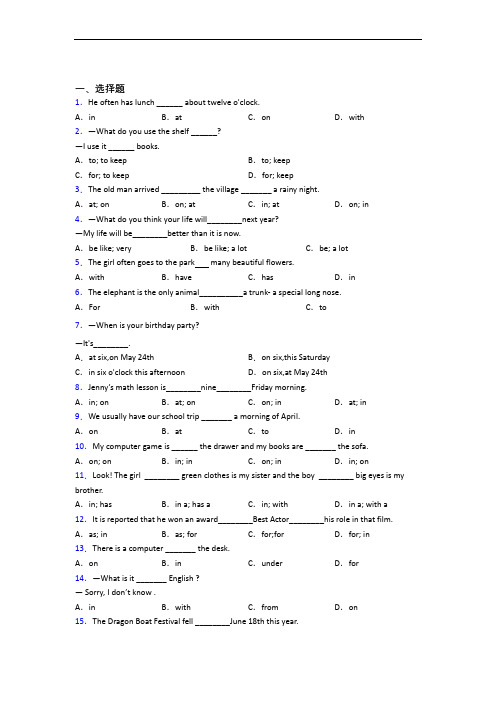
一、选择题1.He often has lunch ______ about twelve o'clock.A.in B.at C.on D.with 2.—What do you use the shelf ______?—I use it ______ books.A.to; to keep B.to; keepC.for; to keep D.for; keep3.The old man arrived _________ the village _______ a rainy night.A.at; on B.on; at C.in; at D.on; in 4.—What do you think your life will________next year?—My life will be________better than it is now.A.be like; very B.be like; a lot C.be; a lot5.The girl often goes to the park many beautiful flowers.A.with B.have C.has D.in6.The elephant is the only animal__________a trunk- a special long nose.A.For B.with C.to7.—When is your birthday party?—It's________.A.at six,on May 24th B.on six,this SaturdayC.in six o'clock this afternoon D.on six,at May 24th8.Jenny’s math lesson is________nine________Friday morning.A.in; on B.at; on C.on; in D.at; in9.We usually have our school trip _______ a morning of April.A.on B.at C.to D.in10.My computer game is ______ the drawer and my books are _______ the sofa. A.on; on B.in; in C.on; in D.in; on 11.Look! The girl ________ green clothes is my sister and the boy ________ big eyes is my brother.A.in; has B.in a; has a C.in; with D.in a; with a 12.It is reported that he won an award________Best Actor________his role in that film. A.as; in B.as; for C.for;for D.for; in 13.There is a computer _______ the desk.A.on B.in C.under D.for 14.—What is it _______ English ?—Sorry, I don’t know .A.in B.with C.from D.on15.The Dragon Boat Festival fell ________June 18th this year.A.in B.to C.on D.from16.My friend, Henry was born June 10th, 1997.A.in B.on C.at D.for17.There________ a hamburger and bananas________there.A.is;in B.are;in C.is;/ D.are;/18.They got married_______ 1960. That means they have been married _______ 1960. A.at; since B.on; in C.in; since D.for; since 19.—It's wonderful, isn't it?— Yes, The large grassland, reaching out far away, looks very beautiful________the blue and clean sky.A.against B.above C.through D.past20.He has a garden __________ a lot of flowers.A.has B.there is C.with21.(2017年安徽) To my pleasure, my family is always _____ me whatever I decide to do. A.above B.behind C.from D.through22.We started out in early spring and headed west the northern part of Asia. A.through B.between C.among D.across23.The next Olympic Games will be held in Japan________ 27th July 2020.A.on B.in C.at D.of24.I want to learn English well because I don’t want to talk with foreigners ________ anybody else.A.by B.through C.across D.at25.–Emma can go out ________ school nights but she must be back ________ ten o’clock.--Oh, I see.A.on, before B.on, after C.in, before D.in, after【参考答案】***试卷处理标记,请不要删除一、选择题1.B解析:B【解析】【分析】【详解】句意:他经常在大约十二点吃午餐。
12 介词in,on,at 全国通用版(含答案)

语法——介词in on atPart 1:知识点一、介词:是一种虚词,在句子中表示名词或代词与其他词之间的关系,不能单独做为句子成分,常位于名词或代词前面构成介词短语。
二、具体用法:常用介词1.in(1)表示方位:在……里面例句:There are three books in my bag.我书包里有三本书。
(2)表示地点:A.表示在大地方例句:I live in Hangzhou.我住在杭州。
B.表示属于该范围例句:Hei Longji ang lies in the north of China.黑龙江在中国北部。
(3)表示时间:A.表示一段时间(比较长)例:in summer在夏天in 2021在2021年in February 在二月B.表示在早上、下午、晚上例:in the morning/afternoon/evening(4)表示使用某种材料、语言等:例句:I can sing the song in English.我能用英语唱这首歌。
2.on(1)表示地点:在……上面例句:There is an apple on the desk.桌子上有一本书。
(2)表示时间:A.表示在具体某一天的上午、下午或晚上例:on June thirteenth在六月13日on the morning of May 1st在五月一日的早上B.表示在星期几的上午、下午或晚上例:on Friday在周五on Saturday afternoon在周六的下午2.at(1)表示在小地点:例:at school /home(2)表示时间点:例:at seven在七点at night在夜晚Part 2:练习一、用介词填空。
1.My mother begins to work ______ 8:00 ______ t he morning.2.Do you stay ______ home ______ weekend?3.They live ______ a new house now.4.Xinjiang is ______ the west of China.5.Lily usually have breakfast ______ the morning.6.They often have lunch ______ half past twelve.7.What’s this ______ English?8.There is a big gym ______ my school.9.She came to this city ______ 2020.10.It often snows here ______ winter.11.I will be back ______ a month.12.Don’t watch TV too much ______ the evening.13.Sally was born ______ May 11th.14.We don’t go to school ______ Saturday and S unday.15.They were happy ______ that time.16.______ the age of ten, I began to learn English.17.What do you often do ______ noon?18.______ a cold winter morning, I met her in the street.19.Mrs. Green came to Beijing ______ 2005.20.Children wake up very early ______ the morning ofChristmas Day.答案:1.at in2.at on3.in4.in5.in6.at7.in8.in9.in 10.i n 11.in 12.in 13.on 14.on 15.at 16.At 17.at 18.On 19.in 20.on。
(专题精选)初中英语语法知识—介词的分类汇编附答案
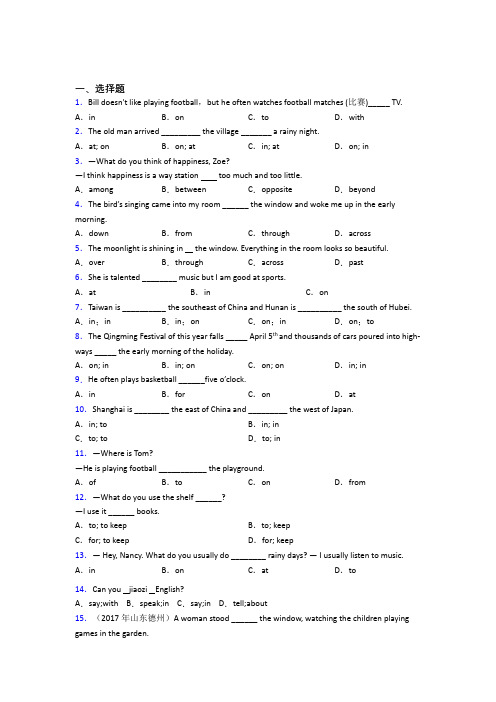
一、选择题1.Bill doesn't like playing football,but he often watches football matches (比赛)_____ TV. A.in B.on C.to D.with2.The old man arrived _________ the village _______ a rainy night.A.at; on B.on; at C.in; at D.on; in 3.—What do you think of happiness, Zoe?—I think happiness is a way station too much and too little.A.among B.between C.opposite D.beyond4.The bird’s singing came into my room ______ the window and woke me up in the early morning.A.down B.from C.through D.across5.The moonlight is shining in the window. Everything in the room looks so beautiful. A.over B.through C.across D.past6.She is talented ________ music but I am good at sports.A.at B.in C.on7.Taiwan is __________ the southeast of China and Hunan is __________ the south of Hubei. A.in;in B.in;on C.on;in D.on;to8.The Qingming Festival of this year falls _____ April 5th and thousands of cars poured into high-ways _____ the early morning of the holiday.A.on; in B.in; on C.on; on D.in; in9.He often plays basketball ______five o’clock.A.in B.for C.on D.at 10.Shanghai is ________ the east of China and _________ the west of Japan.A.in; to B.in; inC.to; to D.to; in11.—Where is Tom?—He is playing football ___________ the playground.A.of B.to C.on D.from 12.—What do you use the shelf ______?—I use it ______ books.A.to; to keep B.to; keepC.for; to keep D.for; keep13.— Hey, Nancy. What do you usually do ________ rainy days? — I usually listen to music. A.in B.on C.at D.to14.Can you jiaozi English?A.say;with B.speak;in C.say;in D.tell;about15.(2017年山东德州)A woman stood ______ the window, watching the children playing games in the garden.A.past B.through C.across D.by16.This pair of jeans looks nice _____ Sandy, because she looks very nice _____ blue. A.on; in B.in; on C.for; on D.to; in17.It’s very kind ___________ you to lend me your reusable shopping bags.A.of B.for C.to D.with 18.Nature has given us the ability to learn________watching others. Children do it naturally. A.by B.in C.on19.—What's the weather _______ in Spring?—Pardon?(什么,请再说一遍)—How is the weather________in Spring?A.like;/ B./;like C.be like;/ D./;be like 20.There________ a hamburger and bananas________there.A.is;in B.are;in C.is;/ D.are;/21.—Hi, Jane. What time do you get up __________ weekdays?—I usually get up __________ about six o’clock.A.in; at B.on; at C.at; at D.on; on 22.—What are these ________ English?—These are egg-cups.A.at B.to C.on D.in23.(2017年安徽) To my pleasure, my family is always _____ me whatever I decide to do. A.above B.behind C.from D.through24.We started out in early spring and headed west the northern part of Asia. A.through B.between C.among D.across25.My teacher runs ______ the morning. But he doesn't run ______ Sunday morning. A.in;on B.on;in C.in;in D.on;on【参考答案】***试卷处理标记,请不要删除一、选择题1.B解析:B【解析】句意:比尔不喜欢踢足球,但他经常在电视上看足球比赛。
初中英语语法知识—介词的分类汇编含答案解析(2)

一、选择题1.I can’t go out ________ school nights because I have to finish my homework first.A.at B.in C.on2.I bought the tomatoes ________ the vegetable stall.A.at B.in C.on D.from3.—Do you know the girl ________ red skirts?—Yes, she is my sister.A.at B.on C.in D.to4.The girl often goes to the park many beautiful flowers.A.with B.have C.has D.in5.The bird’s singing came into my room ______ the window and woke me up in the early morning.A.down B.from C.through D.across6.Lily and Lucy _______ their mother. They have big eyes and yellow hair.A.like both B.both are like C.both like D.are both like 7.—Mary's birthday is ________ March. What about Lucy's?—Her birthday is ________ December 10th.A.in;on B.on;in C.on;on8.My uncle has taught in this school________ he was twenty years old.A.after B.for C.until D.since9.It’s necessary for Tony to do ____ thing ____ his classmates do.A.same, as B.same, like C.the same, to D.the same, as10.Taiwan is __________ the southeast of China and Hunan is __________ the south of Hubei. A.in;in B.in;on C.on;in D.on;to11.If you can’t read the article, it will be meaningless to you. The –less in the word “meaningless” means .A.with B.without C.full of D.out of 12.North Korea is________Asia. It’s________the northeast of China and________the west of Japan.A.in, to, on B.in, on, to C.on, in, to D.to, on, in 13.He is__________ outgoing student long hair..A.a,with, B.an,with C.a,of D.an,of 14.—What is it _______ English ?—Sorry, I don’t know .A.in B.with C.from D.on15.We usually have our school trip _______ a morning of April.A.on B.at C.to D.in16.Jim and Tim are talking _______ the phone.A.at B.on C.with D.in17.The accident took place ________ a cold February evening.A.on B.in C.at D.for18.It is not easy to cross the river ________ a ropeway.A.from B.with C.by D.on19.My daughter usually gets up at 6:00 ________ the morning, but ________ Sunday morning she gets up at 8:00.A.in; in B.in; on C.on; in D.on; on20.---Do you prefer coffee _____milk in it?---Sometimes, but most of the time I ______drink black coffee.A.or, would rather B.with, prefer C.with, would rather D.to, prefer21.If success is a gate, the road this gate must be made up of difficulties.A.towards B.against C.opposite D.beyond 22.Nature has given us the ability to learn________watching others. Children do it naturally. A.by B.in C.on23.I have to prepare ________my math test________ Friday afternoon.A.at; on B.for; on C.on ;for24.He has a garden __________ a lot of flowers.A.has B.there is C.with25.Thanks ______your family photos, they are very nice.A.to B.in C.for D.at【参考答案】***试卷处理标记,请不要删除一、选择题1.C解析:C【解析】【分析】【详解】句意:在学校我晚上不能出去,因为我必须先完成作业。
语法知识—介词的全集汇编附答案
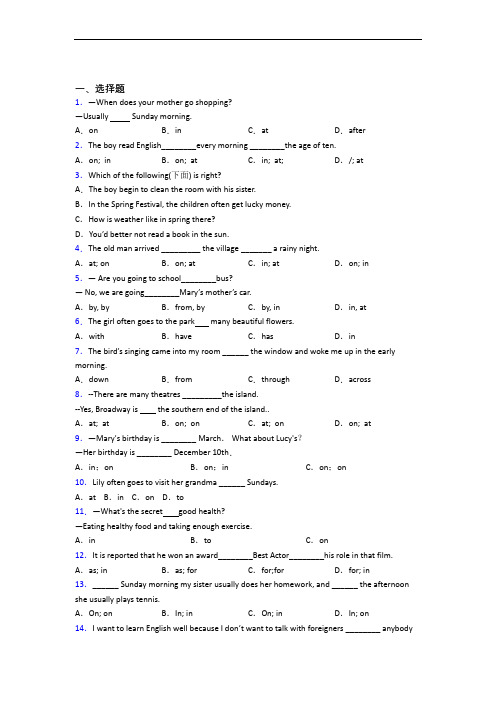
一、选择题1.—When does your mother go shopping?—Usually Sunday morning.A.on B.in C.at D.after2.The boy read English________every morning ________the age of ten.A.on; in B.on; at C.in; at; D./; at3.Which of the following(下面) is right?A.The boy begin to clean the room with his sister.B.In the Spring Festival, the children often get lucky money.C.How is weather like in spring there?D.You’d better not read a book in the sun.4.The old man arrived _________ the village _______ a rainy night.A.at; on B.on; at C.in; at D.on; in5.— Are you going to school________bus?—No, we are going________Mary’s mother’s car.A.by, by B.from, by C.by, in D.in, at6.The girl often goes to the park many beautiful flowers.A.with B.have C.has D.in7.Th e bird’s singing came into my room ______ the window and woke me up in the early morning.A.down B.from C.through D.across8.--There are many theatres _________the island.--Yes, Broadway is the southern end of the island..A.at; at B.on; on C.at; on D.on; at 9.—Mary's birthday is ________ March. What about Lucy's?—Her birthday is ________ December 10th.A.in;on B.on;in C.on;on10.Lily often goes to visit her grandma ______ Sundays.A.at B.in C.on D.to11.—What's the secret good health?—Eating healthy food and taking enough exercise.A.in B.to C.on12.It is reported that he won an award________Best Actor________his role in that film. A.as; in B.as; for C.for;for D.for; in13.______ Sunday morning my sister usually does her homework, and ______ the afternoon she usually plays tennis.A.On; on B.In; in C.On; in D.In; on14.I want to learn English well because I don’t want to talk with foreigners ________ anybodyelse.A.by B.through C.across D.at15.My computer game is ______ the drawer and my books are _______ the sofa.A.on; on B.in; in C.on; in D.in; on 16.There is a computer _______ the desk.A.on B.in C.under D.for17.It is not easy to cross the river ________ a ropeway.A.from B.with C.by D.on18.---Do you prefer coffee _____milk in it?---Sometimes, but most of the time I ______drink black coffee.A.or, would rather B.with, prefer C.with, would rather D.to, prefer 19.Tom and Black clothes store is ______a great sale. It has nice shirts _______all colors. A.at; in B.on; at C.of; in20.They got married_______ 1960. That means they have been married _______ 1960. A.at; since B.on; in C.in; since D.for; since 21.—It's wonderful, isn't it?— Yes, The large grassland, reaching out far away, looks very beautiful________the blue and clean sky.A.against B.above C.through D.past22.Tom was born________London________May lst, 2001.A.in; in B.in; on C.on; on D.on; in 23.—Where is Hubei?—It’s _______ the north of Hunan.A.in B.to C.on24.He has a garden __________ a lot of flowers.A.has B.there is C.with25.Taiwan is __________ the southeast of China and Hunan is __________ the south of Hubei. A.in;in B.in;on C.on;in D.on;to【参考答案】***试卷处理标记,请不要删除一、选择题1.A解析:A【解析】【详解】on在(用于具体的某一天,或上、下午、晚上有修饰词时);in在(用于上、下午、晚上,年,月等);at在(用于某一时刻);after在……之后;这里指某天的上午或下午,晚上要用介词on。
新初中英语语法知识—介词的全集汇编附解析
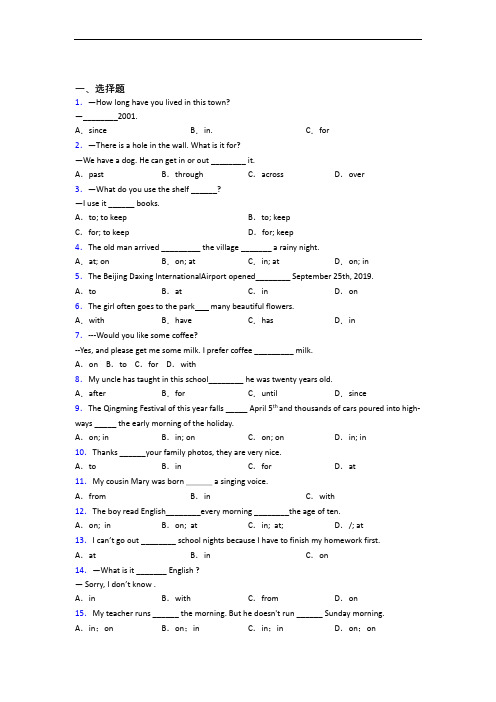
一、选择题1.—How long have you lived in this town?—________2001.A.since B.in. C.for2.—There is a hole in the wall. What is it for?—We have a dog. He can get in or out ________ it.A.past B.through C.across D.over3.—What do you use the shelf ______?—I use it ______ books.A.to; to keep B.to; keepC.for; to keep D.for; keep4.The old man arrived _________ the village _______ a rainy night.A.at; on B.on; at C.in; at D.on; in5.The Beijing Daxing InternationalAirport opened________ September 25th, 2019.A.to B.at C.in D.on6.The girl often goes to the park many beautiful flowers.A.with B.have C.has D.in7.---Would you like some coffee?--Yes, and please get me some milk. I prefer coffee _________ milk.A.on B.to C.for D.with8.My uncle has taught in this school________ he was twenty years old.A.after B.for C.until D.since9.The Qingming Festival of this year falls _____ April 5th and thousands of cars poured into high-ways _____ the early morning of the holiday.A.on; in B.in; on C.on; on D.in; in 10.Thanks ______your family photos, they are very nice.A.to B.in C.for D.at11.My cousin Mary was born ___ a singing voice.A.from B.in C.with12.The boy read English________every morning ________the age of ten.A.on; in B.on; at C.in; at; D./; at13.I can’t go out ________ school nights because I have to finish my homework first.A.at B.in C.on14.—What is it _______ English ?—Sorry, I don’t know .A.in B.with C.from D.on15.My teacher runs ______ the morning. But he doesn't run ______ Sunday morning. A.in;on B.on;in C.in;in D.on;on16.—What is Linda doing?—She is talking ________ the phone with her friend ________ a movie.A.in; for B.on; on C.about; on D.on; about 17.The accident took place ________ a cold February evening.A.on B.in C.at D.for18.It’s very kind ___________ you to lend me your reusable shopping bags.A.of B.for C.to D.with19.If success is a gate, the road this gate must be made up of difficulties.A.towards B.against C.opposite D.beyond 20.—What's the weather _______ in Spring?—Pardon?(什么,请再说一遍)—How is the weather________in Spring?A.like;/ B./;like C.be like;/ D./;be like 21.—It's wonderful, isn't it?— Yes, The large grassland, reaching out far away, looks very beautiful________the blue and clean sky.A.against B.above C.through D.past 22.—Where is Hubei?—It’s _______ the north of Hunan.A.in B.to C.on23.We started out in early spring and headed west the northern part of Asia. A.through B.between C.among D.across24.I want to learn English well beca use I don’t want to talk with foreigners ________ anybody else.A.by B.through C.across D.at25.We have four lessons ________ the morning.A.in B.on C.at D.for【参考答案】***试卷处理标记,请不要删除一、选择题1.A解析:A【解析】【分析】【详解】句意:——你在这个镇上住了多久了?——自2001年以来。
- 1、下载文档前请自行甄别文档内容的完整性,平台不提供额外的编辑、内容补充、找答案等附加服务。
- 2、"仅部分预览"的文档,不可在线预览部分如存在完整性等问题,可反馈申请退款(可完整预览的文档不适用该条件!)。
- 3、如文档侵犯您的权益,请联系客服反馈,我们会尽快为您处理(人工客服工作时间:9:00-18:30)。
解析:D
【解析】
试题分析:in在……里面;on在作用中;about关于;with带有,伴随。这里是with的复合结构,with+宾语+副词。句意:不要开着灯离开房间。结合语境可知选D。
考点:考查with的复合结构。
15.B
解析:B
【解析】
【分析】
【详解】
句意:——你好,南希。你在雨天通常做什么?——我通常听音乐。
2.C
解析:C
【解析】
【详解】
句意:据报道,他因在那部电影中的角色而获得最佳男演员奖。
考查介词。第一空,根据空后Best Actor可知,此空是“表示对象、用途等”关于的意思,应填介词for,故排除A和B;第二空,根据空后his role in that film.可知,此空是“因为,由于”的意思,此空应填连词for,故排除D,故选C。
句意:——你在这个镇上住了多久了?——自2001年以来。
考查时间介词,根据问句中的疑问词为how long“多久”,询问时间段,且该句为现在完成时态,对照选项可知since 2001意为“自从2001年”,表示动作发生在过去一直持续到现在,通常用与现在完成时态,in 2001,“在2001年”表示过去的一个时间,通常用于一般过去时态,故排除B;for+时间段,排除C;故选A。
5.B
解析:B
【解析】
【分析】
【详解】
句意:——保持身体健康的秘诀是什么?——吃健康的食物和多做锻炼。
考查介词。in接某年某月某季节;to向,朝着;on接具体某一天。根据句意,空格处表示"身体健康的秘诀",固定搭配the secret to ……的秘诀,所以空格处用介词to。故选B。
6.D
解析:D
【解析】
A.inB.toC.on
6.My uncle has taught in this school________ he was twenty years old.
A.afterB.forC.untilD.since
7.______ Sunday morning my sister usually does her homework, and ______ the afternoon she usually plays tennis.
--Yes, Broadway isthe southern end of the island..
A.at; atB.on; onC.at; onD.on; at
5.—What's the secretgood health?
—Eating healthy food and taking enough exercise.
一、选择题
1.Look! The girl ________ green clothes is my sister and the boy ________ big eyes is my brother.
A.in; hasB.in a; has aC.in; withD.in a; with a
2.It is reported that he won an award________Best Actor________his role in that film.
A.On; onB.In; inC.On; inD.In; on
8.Taiwan is _________ the southeast of China.
A.toB.inC.fromD.on
9.—When does your mother go shopping?
—UsuallySunday morning.
A.or, would ratherB.with, preferC.with, would ratherD.to, prefer
21.It’s very kind ___________ you to lend me your reusable shopping bags.
A.ofB.forC.toD.with
【分析】
【详解】
句意:我的叔叔在他20岁的时候就在这个学校教书了。
考查现在完成时。after在……之后;for为了;until直到;since自从。根据题干中的“has taught”可知是现在完成时,现在完成时的时间标志词:since+时间点;for+时间段;he was twenty years old他20岁的时候是时间点,要用since。故选D。
22.Tom was born________London________May lst, 2001.
A.in; inB.in; onC.on; onD.on; in
23.—Where is Hubei?
— It’s _______ the north of Hunan.
A.inB.toC.on
24.The next Olympic Games will be held in Japan________ 27th July 2020.
考查谓语动词,live in住在某地;live居住,不及物动词;has有,动词;with带有,介词。在第一个句子中,what是句子的宾语,故live后应加介词in,排除B和D;答语是省略回答,完整回答是I live in a flat….,故空后是一个后置定语,修饰名词A flat,应用介词with。故选A。
【点睛】
时间介词in可以用在早、中、晚的前面,例如:in the morning/afternoon/evening;但是如果是在具体某一天的早、中、晚的前面,则要使用介词on,本题中the morning of July 1表示具体一天的早上,所以介词使用on。
13.A
解析:A
【解析】
【分析】
【详解】
A.as; inB.as; forC.for;forD.for; in
3.The girl often goes to the parkmany beautiful flowers.
A.withB.haveC.hasD.in
4.--There are many theatres _________the island.
3.A
解析:A
【解析】
【分析】
【详解】
句意:这个女孩经常带着美丽的花去公园。
考查介词的用法。with和,表示伴随;have有;has有;in在……里面。根据句意可知女孩带着“美丽的花”,表示伴随,用with。故选A。
4.D
解析:D
【解析】
【分析】
【详解】
句意:——这个岛上有许多剧院_。——是的,百老汇是在岛的最南端。表示在某个岛上习惯用介词on,即on the island;at the end of在……的末端。故选D。
19.This pair of jeans looks nice _____ Sandy, because she looks very nice _____ blue.
A.on; inB.in; onC.for; onD.to; in
20.---Do you prefer coffee _____milk in it?---Sometimes, but most of the time I ______drink black coffee.
A.onB.inC.atD.of
25.I can’t go out ________ school nights because I have to finish my homework first.
A.atB.inC.on
【参考答案】***试卷处理标记,请不要删除
一、选择题
1.C
解析:C
【解析】
【分析】
【详解】
句意:看!那个穿着红色衣服的女孩是我的姐姐,那个有一双大眼睛的男孩是我的弟弟。
考查介词及零冠词。“in+颜色+(衣物名词)”表达“穿着什么颜色的衣服”;clothes是一个集体数名词,本身就是复数,前面不需要加a。第二句“is ”是句子的谓语部分,空处不需要动词只需要加介词“with”表示伴随状态描述人的相貌“有一双大眼睛的男孩”;eyes是一个复数名词,前面不需要加a。故选C。
A.onB.inC.atD.after
10.— What kind of home do you? — A flatthree bedrooms.
A.live in; withB.live; withC.live in; hasD.live; has
11.If you can’t read the article, it will be me the word “meaningless” means.
A.withB.withoutC.full ofD.out of
12.—Why ______ you so busy these days?
—Because they arrived ______ London ______ the morning of July1.
A.are; in , inB.are; in , onC.do; on , inD.do; at , on
13.—How long have you lived in this town?
—________2001.
A.sinceB.in.C.for
14.Don’t leave the room _____ the light on .
A.inB.onC.aboutD.with
15.— Hey, Nancy. What do you usually do ________ rainy days? — I usually listen to music.
12.B
解析:B
【解析】
